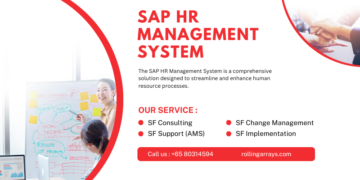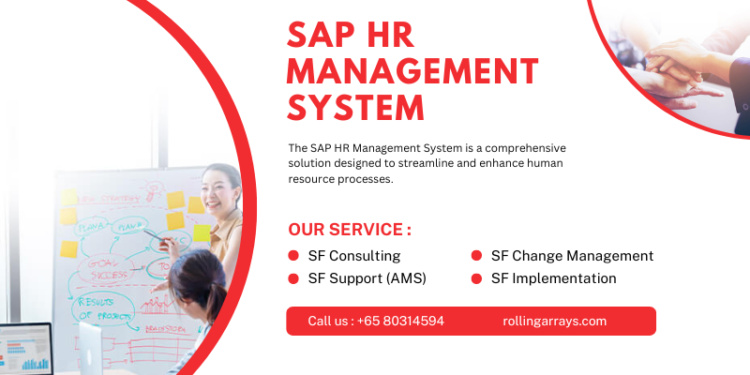As businesses evolve in an increasingly digital world, the role of Human Resource (HR) departments is transforming at a rapid pace. The future of HR management is marked by the integration of advanced technologies that streamline processes, enhance employee experiences, and drive organizational efficiency. One such technology leading this transformation is the SAP HR Management System. This system is not just a tool but a strategic asset that can redefine how HR departments operate and contribute to organizational success.
The Evolution of HR Management
Historically, HR departments were primarily administrative hubs, handling tasks such as payroll, recruitment, and employee records. However, as organizations recognize the critical role of human capital in achieving strategic goals, HR functions are shifting towards a more strategic and proactive role. This evolution is driven by the need for more data-driven decision-making, improved employee engagement, and enhanced operational efficiency.
The Role of Technology in Shaping HR
The advent of digital technologies has revolutionized HR practices. Automation, data analytics, and artificial intelligence (AI) are now integral to modern HR strategies. These technologies not only simplify administrative tasks but also provide valuable insights into employee performance, recruitment trends, and organizational health. The SAP HR Management System is at the forefront of this technological shift, offering a comprehensive solution to meet the complex needs of today’s HR departments.
What is SAP HR Management System?
SAP HR Management System is a robust platform designed to support various HR functions within an organization. It provides a suite of tools and modules that cover essential HR areas, including:
- Recruitment and Onboarding: The system streamlines the recruitment process by automating job postings, candidate tracking, and interview scheduling. It also facilitates smooth onboarding by providing new hires with the necessary resources and information to integrate quickly into the company culture.
- Employee Data Management: Centralized employee records management is a core feature of SAP HR. It ensures that all employee information is accurate, up-to-date, and easily accessible. This includes personal details, employment history, performance records, and compliance documents.
- Payroll and Benefits Administration: The system automates payroll processing, tax calculations, and benefits management. This reduces errors, ensures timely payments, and helps manage employee benefits more effectively.
- Performance Management: SAP HR supports performance appraisal processes by providing tools for setting goals, tracking progress, and conducting evaluations. This helps in aligning employee performance with organizational objectives and identifying areas for development.
- Learning and Development: The system offers functionalities for managing training programs, tracking employee development, and assessing learning outcomes. This ensures that employees have access to continuous learning opportunities to enhance their skills and career growth.
- Employee Self-Service: SAP HR includes self-service portals for employees to access their records, request time off, and view payslips. This feature enhances employee engagement and reduces the administrative burden on HR staff.
Benefits of Implementing SAP HR Management System
Implementing SAP HR Management System offers several advantages that can significantly impact an organization’s HR functions:
- Enhanced Efficiency: By automating routine tasks and providing integrated solutions, SAP HR reduces manual efforts and minimizes errors. This leads to faster processing times and allows HR professionals to focus on more strategic activities.
- Data-Driven Insights: The system’s analytical capabilities enable HR departments to generate valuable insights from employee data. This helps in making informed decisions regarding recruitment, performance management, and employee retention.
- Improved Compliance: SAP HR ensures that HR processes comply with legal and regulatory requirements. It provides tools for tracking compliance-related activities, such as tax regulations and labor laws, reducing the risk of non-compliance.
- Scalability and Flexibility: As organizations grow, their HR needs evolve. SAP HR is scalable and can be customized to meet the specific requirements of different businesses, making it a versatile solution for companies of all sizes.
- Enhanced Employee Experience: The self-service features and streamlined processes contribute to a better employee experience. Employees can manage their own information, access resources, and engage with the company more effectively.
The Future Outlook
As organizations continue to adapt to changing business environments, the role of SAP HR Management System in HR transformation will become even more prominent. The future of HR management will likely see further advancements in AI and machine learning, enabling even greater automation and predictive analytics. Integration with other enterprise systems and platforms will also enhance the system’s capabilities, providing a more holistic view of organizational performance.
Moreover, as the focus on employee experience intensifies, SAP HR will play a crucial role in creating a more connected and engaging work environment. Its ability to provide real-time insights and support data-driven decision-making will be essential in navigating the complexities of modern HR management.
Conclusion
The future of HR management is inextricably linked to technological advancements, and the SAP HR Management System stands out as a pivotal tool in this transformation. By embracing this system, organizations can streamline their HR processes, gain valuable insights, and enhance the overall employee experience. As businesses continue to evolve, SAP HR will be at the forefront, driving innovation and shaping the future of human resource management. Embracing this technology today ensures that HR departments are not only prepared for the future but are also positioned to lead and inspire in an ever-changing landscape
Digital marketing is the use of the internet and electronic devices to promote products or services. It includes tactics like social media ads, email campaigns, search engine optimization (SEO), and online content to connect businesses with potential customers. It's a fast, targeted, and measurable way to reach people where they spend their time—online.
























































